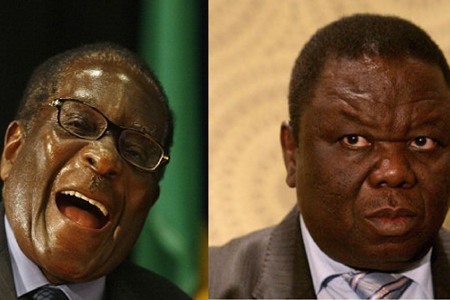
ZIMBABWEANS should not expect radical changes if either President Robert Mugabe or Prime Minister Morgan Tsvangirai wins the forthcoming elections, analysts have said.
BY PATRICE MAKOVA
The two are the leading contenders in elections expected in June or July this year, while MDC leader, Professor Welshman Ncube is placed third in the race.
Political analyst, Jabusile Shumba said while a Tsvangirai win would be a democratic breakthrough, it would take his MDC-T government time to economically and politically transform the country.
“If Tsvangirai wins, the nation will be greeted by euphoria similar to 1980, although it will take some time for the change to translate into material benefit,” he said. “Economic transformation and democratic consolidation processes will take a bit of time.”
Shumba said on the other hand, a victory by Mugabe would signal continued “patrimonial politics, clientelism and a democratic reversal”.
He said Zimbabwe needed change at a political level.
“Politicians need to be reminded that they are there to serve at the pleasure of citizens, which is the tenet of democracy,” said Shumba.
- Chamisa under fire over US$120K donation
- Mavhunga puts DeMbare into Chibuku quarterfinals
- Pension funds bet on Cabora Bassa oilfields
- Councils defy govt fire tender directive
Keep Reading
University of Zimbabwe political science lecturer, Shakespeare Hamauswa said if Tsvangirai won, it was unlikely that far-reaching policy changes would be introduced because of the entrenched interests of Zanu PF and securocrats, especially in the mining and farming sectors.
“There will be change in policy, but it will not be radical. An MDC-T government is likely to implement those reforms which Zanu PF rejected during the era of the GNU,” he said.
Hamauswa said a Tsvangirai government was likely to embrace an indigenisation policy which does not support the grabbing of companies for free.
He said Zimbabwe’s international status would be restored, while western sanctions would be removed.
“Political stability in the country will depend on his method of ruling and the way he handles elements within Zanu PF and securocrats,” said Hamauswa.
He said electoral victory by Mugabe would mean that the Zanu PF politburo would continue determining the destiny of the country, while cabinet would be there just to rubber stamp its decisions.
Another political analyst, Thabani Nyoni said a Tsvangirai win would likely generate a lot of euphoria around issues of key reforms such as those to do with media and security sector.
“But once people are in power, the dynamics and priorities may change from key reforms to delivery of service,” he said.
The Bulawayo Agenda executive director noted a Tsvangirai win would be a test of character for Zanu PF as to whether the party can peacefully hand over power.
He said Mugabe’s loss could mean the end of Zanu PF as a political party.
Nyoni said Zanu PF used to be sustained because there was no separation between government and the party.
“Removing Zanu PF from the state is tantamount to suffocating the party,” he said. “That is why it may be difficult for the party to hand over power if it loses. The party may as well follow the route of Kenya’s Kanu and Zambia’s UNIP that completely disappeared when they lost elections.”
But Nyoni said it was unlikely that Tsvangirai would be the same person people expected him to be once he was in power. He said Tsvangirai had already shown that he could be a different person as shown by his acceptance of last week’s controversial appointments of new chiefs for the Zimbabwe Electoral Commission and the Zimbabwe Human Rights Commission.
Nyoni, a lecturer with a local university, predicted that if Tsvangirai won, there would be another electoral pact between Zanu PF and the MDC-T to safeguard the interests of the former ruling party. He said while a new government would be under pressure to address human rights, including past abuses, this expectation was unlikely to be met.
The university lecturer said if Zanu PF won, the party would immediately address the issue of Mugabe’s succession. He said the MDC-T on the other hand would find it difficult to sustain the movement as a viable political party, resulting in frustrations and more internal fights.
“This might also signal the end of Tsvangirai’s political career,” he said. “Zanu PF will take advantage of this and appoint a few MDC officials into government. Bringing on board the opposition will weaken and divide the party.”
Nyoni said if Mugabe won the elections in a free and fair manner, the international community would not be as scathing on Zanu PF as before.
“There is going to be a move by the European Union and United States to engage and work with the government rather than confrontation as long as elections are free and fair,” he said. Nyoni was also confident that Zanu PF was capable of introducing reforms in order to win legitimacy.











